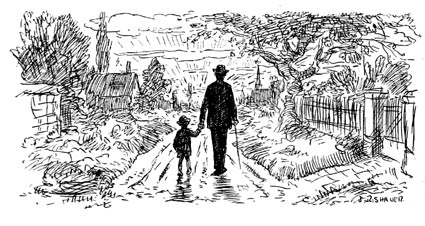from Red Cross Magazine
Billy Brad Meets Rent and Taxes
by Ellis Parker Butler
One day when Billy Brad was six years old he went for a walk with his Uncle Peter Henry, who was quite bald, and wore big spectacles with real tortoise-shell rims, and looked as wise as an owl. Billy Brad was taking Uncle Peter Henry to see his little school garden, which was growing very nicely, with radishes and beets and turnips and corn, all in rows.
Billy Brad was very proud of his garden. It was one of the best kept and most flourishing of all the little school gardens. Already Billy Brad had pulled so many crispy little red radishes from his garden, selling them to his mother, that he had been able to put a big, round radish dollar in the Savings Bank to keep his big, round birthday dollar company.
When they reached Billy Brad's garden, Uncle Peter Henry said he was amazed and surprised and altogether delighted that it was such a beautiful garden.
"I think you must like to garden, Billy Brad," Uncle Peter Henry said.
"Yes," said Billy Brad promptly, "and I'm going to be a farmer, I am."
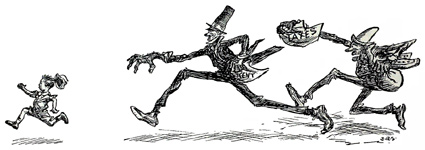
"When you grow up?" asked Uncle Peter Henry.
"Yes," said Billy Brad. "Always! When I grow up. And when I don't grow up. And next year. For because Henny is a farmer and I'm going to be a farmer, too, next year."
"Henny?" said Uncle Peter Henry thoughtfully. "Let me see. Henny is Henry Staples, isn't he? And he is one of the boys of the Corn Club, isn't he? And he is growing corn in that little field beyond your house, isn't he? In Mr. Giffen's field?"
"Yes," said Billy Brad, "and I am going to grow corn in Mr. Giffen's field, I am. And I am going to sell my corn, too, I am. And I'm going to have whole lots of big, round corn dollars. And I am going to put them in the Savings Bank, I am."
"I see!" said Uncle Peter Henry. "You want to grow corn and sell the corn, and you want to rent part of Mr. Giffen's field."
"No," said Billy Brad. "I don't want to rent it; I just want to farm my corn on it."
"Well, I don't know, Billy Brad," said Uncle Peter Henry, "but I am afraid you will have to rent it if you want to use it."
"Why will I?" asked Billy Brad.
"Because that ground is very valuable ground and I don't believe Mr. Giffen will let you use it unless you rent it. But I know a good way to make sure."
"What way?" asked Billy Brad.
"Asking Mr. Giffen is the best way to make sure," said Uncle Peter Henry. "Suppose we go and see Mr. Giffen and ask him? Shall we?"
"Yes, Uncle Peter Henry," said Billy Brad.
So Uncle Peter Henry took Billy Brad's hand and they walked toward the field Mr. Giffen owned, because Mr. Giffen was sure to be in his field at that time of day.
As they walked along, Billy Brad wondered what he would have to do if he rented the ground that was owned by Mr. Giffen. He was not quite sure what "renting" ground meant. He did not know whether it meant he would have to plow the ground with some kind of plow, or build some kind of fence around the ground, or take stones off the ground and pile them in a corner. If "renting" the ground meant plowing it with a big plow and two big horses Billy Brad was afraid he was not big enough to "rent" the ground. So he looked up at Uncle Peter Henry and said, shyly:
"Uncle Peter Henry --"
"Yes, Billy Brad?"
"What is 'renting' it?"
"Why, when you rent anything you pay for the use of it," said Uncle Peter Henry.
"For Mr. Giffen's ground?" asked Billy Brad.
"Yes," said Uncle Peter Henry. "Rent is the money you have to pay for being allowed to use the ground another man owns, or for the house he owns, or for a part of the house,
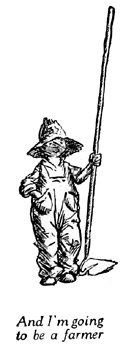 or for a store building, or a factory or anything that stands on a man's ground -- a barn or a garage or a chicken-coop."
or for a store building, or a factory or anything that stands on a man's ground -- a barn or a garage or a chicken-coop."
"Is it money?" asked Billy Brad anxiously.
"I'm afraid it is, usually, money," said Uncle Peter Henry.
"A big, round dollar?" asked Billy Brad still more anxiously.
"It would not surprise me a bit if Mr. Giffen wanted a big, round dollar as rent for as much ground as you will want to grow corn on," said Uncle Peter Henry, and he smiled, for Billy Brad looked worried. And Billy Brad was really worried, too. He did not want to give up one of his big, round dollars as rent money.
"But I don't want to pay Mr. Giffen one of my big, round dollars for rent," he said. "I want to keep both my big, round dollars."
"I don't doubt that one bit," said Uncle Peter Henry. "Most of us feel just that very same way about it. Billy Brad. We hate to pay rent! We would far rather live in
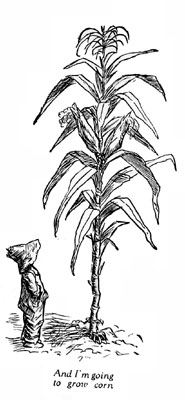 Mr. Giffen's house without paying him, or use Mr. Giffen's ground without paying him. But I don't see how you can avoid paying rent to Mr. Giffen if you want to use his ground."
Mr. Giffen's house without paying him, or use Mr. Giffen's ground without paying him. But I don't see how you can avoid paying rent to Mr. Giffen if you want to use his ground."
"Why can't I?" asked Billy Brad.
"Because, for one reason, Mr. Giffen has to pay taxes on his ground," said Uncle Peter Henry.
"Why does he?" asked Billy Brad.
"Because, if he does not pay his taxes the ground may be taken away from him," said Uncle Peter Henry.
"Why will it?" asked Billy Brad promptly. It was quite wonderful how promptly Billy Brad could ask questions. It was one of the things he could do best. "Why will it be taken away from him, Uncle Peter Henry?"
"Because he is only allowed to own it as long as he does pay taxes," said Uncle Peter Henry. "If he does not pay taxes, the State -- which means, All-the-people -- takes the ground from him and sells it to someone who will pay the taxes. So Mr. Giffen must pay his taxes if he wants to keep his land. He has to pay his taxes every year. So, of course, if he lets you use his ground, the very least he can do, and not lose money, is to make you pay as rent the amount he must pay as taxes. And he might ask you to pay more."
"Why might he?" asked Billy Brad.
"Because," said Uncle Peter Henry, "if you pay Mr. Giffen just enough rent to pay his taxes you might not be paying him enough. Perhaps Mr. Giffen borrowed the money to buy the ground and has to pay six cents a year for every dollar he borrowed. Then he might very honestly ask you to add your share of that to the rent."
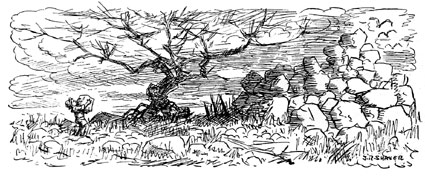
"Why?" asked Billy Brad.
"Because it is part of what the ground is costing him every year. And if he has to keep up a fence around the ground, he can very honestly ask you to add your share of keeping up the fence to the rent you pay him. And if he can use the ground himself and make money for himself by using the ground and lets you use it instead, he can ask you to add to the rent a part of what he would have made if he had used the ground himself. A fair rent, Billy Brad, is an amount of money equal to all it costs a man to own the property he is renting and to keep it in good repair, plus a fair profit on the money he paid for the property. So all men, who own ground, ask us to pay rent when we use the ground."
Billy Brad walked along beside Uncle Peter Henry but he did not say anything for quite a while. He was trying to think of some way to keep him from paying one of his big, round dollars as rent.
"I know!" he said suddenly. "I know what to do, Uncle Peter Henry."
"What?" asked Uncle Peter Henry, for this time it was his turn to do the asking.
"Why -- Why -- " said Billy Brad eagerly, "why, I won't have my farm on ground that anybody owns. I'll have my farm on some ground that somebody don't not own. For because if somebody don't own the ground somebody don't have to pay any taxis."
"Not taxis -- taxes," said Uncle Peter Henry, correcting him, and then he added: "I'm afraid you won't find any ground like that. Billy Brad."
"Why won't I?" asked Billy Brad."
"Because," said Uncle Peter Henry, "all the ground is owned by some man or woman or company. Wherever you go, in civilized countries, the land is owned by men or women or companies."
"Why is it, Uncle Peter Henry?" asked Billy Brad, not much pleased with the idea.
"Because the State -- by which I mean All-the-people -- lets them own it and wants them to own it," said Uncle Peter Henry.
"Why does it?" Billy Brad asked.
"One reason is that it has been found that men and women and companies make the best use of the ground when they 'own' it," said Uncle Peter Henry. "Every one likes to own things and takes better care of them when he owns them. If Mr. Jones 'owns' a piece of ground and knows he can keep it as long as he pays the taxes, he is not afraid to spend his time and money making a good farm of it, clearing away the brush and stones and putting good fertilizer on it to make the soil rich. If he thought the ground might be taken away from him any time, he would not bother much about making it a good farm. Or, if the ground is in a town, and Mr. Jones 'owns' the ground, he is not afraid to spend a great deal of money putting a building on it. He would not do that if it was just anybody's and everybody's ground. You can understand that, Billy Brad?"
"Yes, Uncle Peter," said Billy Brad.
"So that is, really, why the State -- or All-the-people -- lets One-of-the people or Another-of-the-people 'own' the ground as long as the taxes are paid."
"Uncle Peter Henry," said Billy Brad, "what are taxes?"
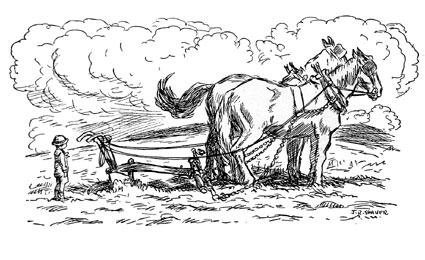
"Well, Billy Brad," said Uncle Peter Henry, "the kind of taxes we are talking about are really rent that is paid to the State by the people who 'own' the ground and the buildings on the ground. The people who 'own' the ground only 'own' it, or have it for their 'own,' as long as they pay the taxes to the State. If they stop paying taxes the State takes the ground away from them, or sells it to some one who will pay the taxes."
"Would it take Mr. Giffen's ground away from him?" asked Billy Brad.
"Certainly," said Uncle Peter Henry. "If Mr. Giffen stops paying taxes, the State -- by which I mean All-the-people -- will take the ground back and sell it to some man who will pay the taxes. Nobody 'owns' any ground for ever and ever, but only for as long as the taxes are paid. So what it amounts to, really, is that, the State -- All-the-people -- is the real owner of all the ground, and the tax is a kind of rent that is paid to All-the-people by One-of-the-people. This is so true that, when All-the-people want the ground that is 'owned' by One-of-the-people (for a street or a park or something that will benefit All-the-people), then One-of-the-people cannot keep the ground. The State can make One-of-the-people sell the ground whether he wants to or not.
"Billy Brad, the only difference between 'owning' a piece of ground and renting it is that the man who 'owns' the ground can keep it himself as long as he pays the tax-rent, or he can sell it, or give it, to some one else, while the man who rents the ground cannot sell it or give it away but can only use it, and only for as long as the 'owner' has agreed to let him use it."
"Until my corn gets ripe, Uncle Peter Henry," said Billy Brad.
"Right!" said Uncle Peter Henry. "And now do you know what a tax is, Billy Brad? A tax on land?"
"A -- a kind of rent," said Billy Brad.
"Right again!" said Uncle Peter Henry. "And do you know what rent is?"
"Yes," said Billy Brad; "it's one of my big, round dollars, Uncle Peter Henry, so I can have my corn farm. For because nobody don't want to pay a big, round dollar but everybody has to pay one. For because my corn farm isn't not my corn farm; it is Mr. Giffen's corn farm. Only I can farm my corn on it!"
"Very well stated," said Uncle Peter Henry, and he patted Billy Brad's shoulder.
By this time they had come to where Mr. Giffen was working in his field. Henny Staples was there, too, working in his little corn field, which was one corner of Mr. Giffen's big field. He called out "Hello, Billy Brad!" and Billy Brad answered "Hello, Henny!"
Mr. Giffen came and leaned on his hoe and Uncle Peter Henry said:
"Here is another young corn farmer for you, Mr. Giffen. This is Billy Brad and he wants to use part of your field next year. He wants to grow corn. May he have about as much ground as Henry has?"
"Why, yes," said Mr. Giffen. "I think I can let Billy Brad use that much. And I won't charge him much rent for it either. Of course, this ground is valuable. It is good ground and grows good corn, and I'm glad to use it all myself, but I will rent a piece to Billy Brad for a dollar a year. How is that?"
"A big, round dollar?" asked Billy Brad.
"That's about the size and shape of it," said Mr. Giffen, laughing. "One big, round dollar! And that is low rent, too. I won't say anything about this ground being extra good ground, or what it has cost me to keep it fertilized and fenced. I'll just say that one big, round dollar as rent for a piece of this ground as big as the piece Henny is using, will just about pay the taxes."
"Fair enough," said Uncle Peter Henry, and then he asked Billy Brad: "Do you want to rent the ground for a big, round dollar?"
"Yes, Uncle Peter Henry," said Billy Brad. So that was all arranged and Billy Brad and Uncle Peter Henry started home, hand in hand.
"And I don't care if I do have to pay rent with my big, round dollar, said Billy Brad cheerfully, "for because I guess, maybe my Uncle Peter Henry will give me another big, round dollar on my birthday. For -- for because -- will you, Uncle Peter Henry?"
"Billy Brad," said Uncle Peter Henry, "I can see you are going to be a financial genius -- a great financial genius!"
"What is a fenankal genius, Uncle Peter Henry?" said Billy Brad.
"Ask me that tomorrow, Billy Brad," said Uncle Peter Henry looking at his watch. "It's supper time now and we'll get left if we don't scoot for home in a jiffy!"
